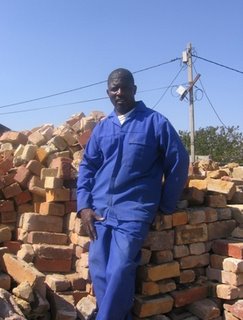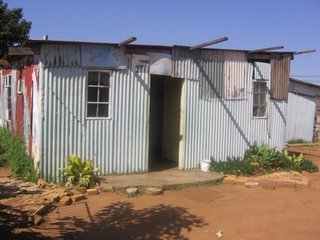 The Road to a New South Africa: Christian Education in Soweto
The Road to a New South Africa: Christian Education in Sowetoby Emily Klooster
Field partners of Worldwide Christian Schools, Pastor Johnson Mncube and his wife Nomsa, run a small Christian school called Africa Outreach in one of the poorest neighborhoods in Soweto. The school began in 1993 with ten children from church-going families in the neighborhood. It has now grown to accommodate more than 70 students from the greater community.
“We are in the informal part of the city, where people of low income were placed because they can’t afford the demands of block houses,” Johnson said. “We are at the moment running a pre-school on which we want to run a big Christian school, as there are no Christian schools in the black communities. There are schools that are multiracial…but there are all kinds of religions taught there. What we have noticed is that all the hard labor we give to bring up a child, when they come out of pre-school all the seed we have planted is whipped away…”
Before Africa Outreach, the children of this neighborhood had no access to an education – it is the first school in the area. “In all of Soweto there is only one Christian school from the Roman Catholics,” said Johnson. “It is in an awkward location and transportation there is not easy for our people, who are not mobile.”
Johnson envisions a school that will address the spiritual void he sees growing amongst the youth of his nation. “[We need to] restore our people back to God,” he said. “…Our children have no idea what God is like except those who go to church. The school plays a big role in placing children in the right place with God. It also plays a role in [encouraging] abstinence and purity, as this is the only cure for the problems of AIDS. Should we fail to build Christian schools…our children will lose sight of who God is.”
The efforts of the Mncubes with their current students are already paying off. “Two weeks back I met a teacher from our neighboring community who has heard about our school,” Johnson said. “He talked about the children that come from our school and asked what method we are using to [produce such] disciplined children.”
Johnson reported that when kids graduate and leave for higher education, many return to the church for Sunday school. “Some have even brought their parents to the knowledge of Christ!” he said.
The Africa Outreach School started out in the Mncubes home, and currently holds classes in temporary structures on the church grounds. The school is struggling to accommodate further growth without the proper space, so the Mncubes are seeking funds through Worldwide Christian Schools to build an addition that will house classrooms for more students. The total cost of the project Johnson envisions is $216,600.
WCS field director Dale Dieleman vouches strongly for the school and the dedication of the Mncubes. “By the commitment of Pastor Johnson to the spiritual, physical, and educational well-being of this community, we see a theme of an Africa for and by Africans being modeled here,” Dieleman said. “Hearing Pastor Johnson’s vision for this school and seeing how it is appreciated makes it evident that his commitment to the community is strong. WCS wants to be as supportive as possible in helping Pastor Johnson realize his dream of providing the first Christian primary school in this neighborhood.”
Dieleman put the work of Africa Outreach into perspective. “This school is helping shape the future of post-apartheid South Africa,” he said. “Soweto will become a symbol of not only the struggle of the past by students, but a commitment to the new generation of students who are carrying on their struggle for recognition and a commitment to a new South Africa. The legacy of freedom and hope of those students in 1976 can still be seen in the eyes of present-day children in Soweto.”
Dieleman finished with these words: “The significance of a Christian school in the area is to provide an alternative to the under-resourced and inadequate schools from the Apartheid era. Soweto is now a community of hope.”
For more information on this project or to donate offline, contact Dale Dieleman: ddieleman@wwcs.org or (800) 886-9000. To donate online to this project, visit wwcs.org and click on The Calling.
The Soul of Soweto: A compilation of ten African songs on two CDs written and performed by Pastor Johnson Mncube. “The Soul of Soweto” is a praise and worship CD to inform and inspire listeners about how the strength and faithfulness of God has seen the people of Soweto through the years. The CD concept was conceived over a discussion between Johnson and Dale Dieleman, WCS field director for Africa, who is also a musician. Over the next months, Dieleman reviewed Johnson’s work and together they selected ten “best of…” songs which were re-mixed in the USA and packaged with English translations of the lyrics from the original Zulu.
“The Soul of Soweto” was born out of Johnson’s desire to use the musical gifts God blessed him with to help fund Christian education. This original CD is only $12, and all proceeds benefit the Africa Outreach Christian School of Soweto. To purchase this one-of-a-kind compilation, contact Dale Dieleman at ddieleman@wwcs.org or (800) 886-9000.
Bekezela (Patience)
Oh! Uyobekezela!
Even if it’s tough, you must be patient
Even if it’s hot, you must be patient
In the whole world,
Be patient
Oh! Patience is needed church
I say to you Christian
I say to you my brother
Even if it’s tough
Even if it’s hot
Even if they hate you
Even if they mock you
Even if they insult you
In everything you must be patient
(translated from Zulu, from The Soul of Soweto)





